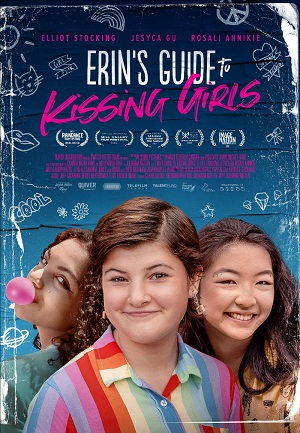theBUZZ Features

Erin’s Guide To Kissing Girls – heartwarming Canadian indie flick from Toronto-based queer filmmaker, Julianna Notten
Erin’s Guide To Kissing Girls tells the story of Erin, the only out person in her grade, and Liz, fellow comic nerd and track star. They find their friendship tested when Liz is accepted to private school and Erin falls hard for new girl and ex child-star, Sydni. Erin believes the only way to save herself from certain doom is to ask Sydni to the big dance, but the plan goes awry when she starts to lose Liz along the way. What originally began as a short of the same name, has played in over 40 film festivals around the world, most notably Frameline42 which later picked it up for distribution.
Julianna Notten is a Toronto-based, award-winning, queer filmmaker and co-founder of Switch Hitter Films. She’s a graduate of the Toronto Metropolitan University (formally Ryerson) Film program, and received both the Norman Jewison Award and Natalie MacDonald Memorial Award. Their thesis film, Earth To Avery, premiered at the TIFF Kids International Film Festival in 2016, and she’s currently developing her first television series, Well That’s Just Super.
The film is playing in Toronto exclusively at the Carlton Cinema, and streaming across digital platforms: Apple, Amazon, Cineplex, Google Play, Microsoft; and Rogers, Bell and Cogeco cable platforms. Available from Quiver Distribution.
Director’s Statement
Erin’s Guide To Kissing Girls is first and foremost a love letter to my younger self. Growing up, I was exposed to the usual assortment of Disney fairy tales and nineties classics loaded with conventional girl-meets-boy narratives. It was an all too familiar story, and began to feel like the only one. Moreover, coming-of-age films with queer characters – when they weren’t missing from my local Megaplex – were rooted in tragedy or centered around a stereotypical portrayal of coming out. The inspiration to write “Erin’s Guide To Kissing Girls” was born out of the frustration I felt with this fact. I wanted to create a character who was confident in her sexuality without sensationalizing it, whose problems reached beyond the fact that she was attracted to other girls.
Being thirteen, everything feels like the be-all-end-all, and for Erin this is no different; she lives in hyperbole. As I was writing the feature-length script, I re-read my grade eight diary and suddenly realized why Erin felt so natural for me to write. Like Erin, I was a tender, fiery ball of emotion and spunk who was suddenly having to deal with all these changes, and maybe not handling them as gracefully as I could have. In many ways I wish I could have been as out and unapologetically myself as Erin is. In the writing and directing of this film I was mindful of not wanting to fall into the trap of making fun of these 13 year-old characters. There is humour in the story because we can all relate to the awkwardness of eighth grade social politics, but it was important to me to still treat the feelings and issues the young leads deal with tenderness and care. It can be easy to look back and laugh at your preteen years with hindsight but when you’re in the middle of it all it is real and it is emotional.
Erin’s strong sense of self – especially when it comes to her sexuality – is a defining characteristic of the story. From the moment the audience meets her, they know that she is extremely confident in who she is. This is not the kind of representation queer youth are used to seeing on screen, and that is exactly why this representation is vital. We’re taking both the coming-of-age and LGBTQ genres and combining them into a fabulously new hybrid.
For a lot of queer people, it’s moving and impactful to see a story like this because, even ten years ago, coming out was a dramatic decision (and still can be for many people). It was unimaginable to be a queer person Erin’s age and be out without facing significant negative consequences. Many queer folks around the world still face a wide range of difficulties, regardless of their age, and Erin does face isolation and misunderstanding from her classmates for being the only out person in her class. These microaggressions are still very much a reality even in today’s “progressive” world and to not portray them in this film would be doing a disservice.
Ultimately, Erin is free to be herself and is accepted by the people in her life she cares about most, which makes this kind of representation unique. Erin’s Guide is a radical film that will have a positive impact for the girls it portrays and the people they love. When queer women tell their own stories on screen, everyone stands to benefit.
About the Author
Bryen Dunn is a freelance journalist with a focus on travel, lifestyle, entertainment and hospitality. He has an extensive portfolio of celebrity interviews with musicians, actors and other public personalities. He enjoys discovering delicious eats, tasting spirited treats, and being mesmerized by musical beats.






